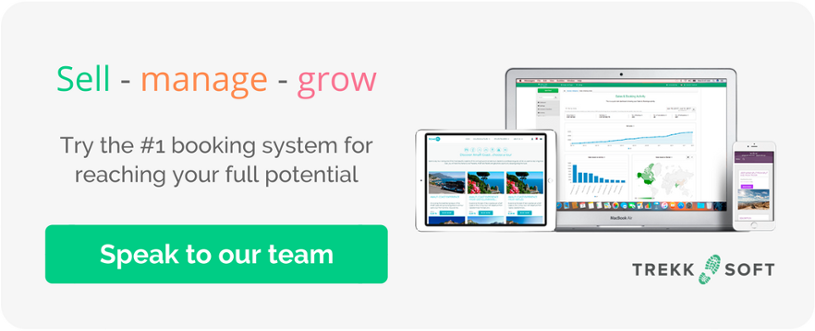When you have a consistent stream of high-quality traffic heading to your website, it's plain sailing for your tour and activity company, especially if you have an online booking system in place.
With this in mind, here are seven of the best ways to get more visitors - and bookings - for your tourism company website.

1. Optimise your website for searchers
Search engine optimisation isn't really about optimising for search engines: it's about optimising for searchers. So to increase your traffic, focus above all on providing a great user experience. This might involve...
- brilliant blog posts
- beautiful site design
- simple navigation
Remember that when people spend time on your website and make repeated visits, Google gets the hint that your site has useful and quality content that’s worth pushing up in searches. When someone ends up on your website, make them want to stay and come back.
2. Be helpful and benefit from Google Panda
Google Panda is an algorithm created by the search giant to lower the rank of low-quality or "thin sites" and return higher-quality sites near the top of the search results. This algorithm means that if you want to attract more visitors to your website, your site has to be useful, informative, and more valuable than that of competitors.
This means tip-top quality text on your website, particularly when it comes to tour and activity descriptions, your homepage, and other key pages (like your "About Us" page).
Download your free Writing Handbook for Tour and Activity Providers to boost your content strategy.
3. Define your niche and excel at it
If your target audience is very specific, it probably isn't an audience of millions. However, this can be an advantage for you: any content you create is likely to be highly relevant to those searching for your offering. This means you can clearly define your niche in a way that the big players can’t, become the expert in your area, and really pay attention to your specialised audience.
Remember that online searches are most likely to include keywords related to your location or service, rather than your brand name. Work in language that relates to where your company is based and what you do, especially on the most viewed pages of your website.
4. Give searchers what they expect
Think about what your website visitor really wants - and expects - from your website. Say you have a kayaking business in the UK's Lake District. When a searcher types into Google "kayaking trips in the Lake District" and they click on your website result, is this what they're expecting to see, with the information they want to read next?
By getting into the mind of the searcher, you're doing your audience a favour as well as your business.
5. Grow your online community while building links
Online networks like the ATTA Hub and LinkedIn groups are excellent ways to get word out about your tours and activities and make new connections. On top of this are the social media networks you can leverage to build your business: to help you on your way, you can check out our social media ebook and blog posts to help you improve your strategy?
6. Write naturally and you'll match search queries

7. Provide answers for people with questions
RankBrain, introduced in 2015, is a Google algorithm designed to provide the best answers to our searches by using advanced machine learning. This makes it more important than ever to answer users’ questions with your content. Clearly display your location, contact information, hours of operation, and pricing on your website, and ideally provide customers with the option to book online to increase chances of a quick conversion.
Write blog posts to answer your frequently asked questions and you will not only have a resource to direct customers with queries to, you will also attract new visitors to your website.





